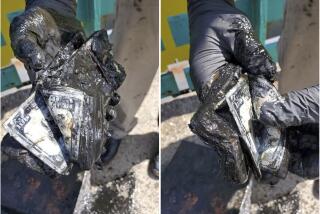Fugitive treasure hunter captured in Florida left behind trove of clues
Reporting from WEST PALM BEACH, Fla. — When authorities nabbed the treasure hunter they’d been chasing for more than two years, they discovered a hotel room strewn with clues as to how he’d evaded them.
Authorities say Thomas Thompson, registered under a fake name, and his companion, Alison Antekeier, had been holed up for some time at a Hilton hotel in Boca Raton, Fla., a retiree haven about 50 miles north of Miami. Last week, when authorities searched the room, they discovered two safes tucked away in the pair’s luggage. The safes held a combined $340,000 — all in $100 bills. At least $80,000 more was stashed around the room.
Thompson had rocketed to fame when he discovered the Ship of Gold — official name: the Central America — 200 miles off the coast of South Carolina. The ship, laden with gold bars and coins worth millions, sank during a hurricane in 1857.
While he was on the lam, Thompson used at least three fake names and Antekeier four, Deputy U.S. Marshal Christopher Crotty testified at a court hearing Wednesday.
In addition to the cash, he said, investigators found ID cards with the pair’s aliases, paperwork explaining how to seek asylum overseas and news stories about the court battle in Ohio that apparently sent the duo on the run.
Thompson, 62, was a deep-sea explorer. Antekeier, 47, was his assistant. In 2012, they failed to appear in an Ohio court for a lawsuit related to Thompson’s discovery of the wreck. A judge issued bench warrants for them, and Thompson was later charged with criminal contempt.
On Wednesday in Florida, U.S. Magistrate Judge Dave Lee Brannon postponed a hearing in order to confirm Thompson’s identity and discuss sending him back to Ohio. (Antekeier is expected to be extradited in the coming days.) But spectators got a glimpse of the eccentric Thompson, who in the 1980s persuaded investors to sink millions into his search for the Ship of Gold.
He succeeded. But he has since been embroiled in court battle after court battle over the ship’s riches. The lawsuit resulting in the warrants was filed by members of the team that helped find the ship.
Thompson promised team members a percentage of the recovered treasure, they said. Some gold, which had been discovered in the California gold rush, was sold in 2000 for tens of millions of dollars. Yet, they said, Thompson stiffed them.
Instead, Thompson and Antekeier hunkered down in a Florida mansion for $3,000 a month — a fee they paid in $100 bills that court papers described as “sweaty.” After the judge issued the warrant, Thompson and Antekeier vanished.
Court documents say a maintenance man who later entered the disheveled home found money wrappers and lengths of pipe, probably used to bury cash underground, as well as sticky notes with court dates scribbled on them, and a dozen cellphones. Apparently each of Thompson’s relatives and associates used a different number to reach him.
The maintenance man, who called authorities after his discoveries, also stumbled on a book called “How to Be Invisible,” described in court papers as a primer on disappearing. One bookmarked page warned: “Use cash always and don’t get bank accounts.”
The U.S. Marshals Service plastered billboards with Thompson’s face and sifted through hundreds of tips. Marshals considered him such a cunning adversary that, in the news release announcing his capture, they called him “one of the smartest fugitives ever sought.”
In the Florida courtroom, Thompson appeared unruffled. He has a head of tight, graying curls, a beard and dark-rimmed glasses. He wore navy jail garb and bright-green socks. His wrists and ankles were shackled. He told the judge that he suffered from a rare autoimmune disease that required custom-made drugs.
“I’m in a very fragile situation right now,” he said.
The magistrate judge was unmoved.
“Your health issue is in no way relevant to whether you’re wanted in Ohio or not,” he said.
When the proceedings ended, Thompson briefly exchanged whispers with Antekeier, who was also shackled. Outside, his sister chastised the media, saying they’d unfairly demonized a man who, in tracking down the Ship of Gold, had accomplished something astonishing.
Softly, her eyes wet, Sandee Thompson Butterworth added, “We should be celebrating what he did.”
More to Read
Sign up for Essential California
The most important California stories and recommendations in your inbox every morning.
You may occasionally receive promotional content from the Los Angeles Times.










